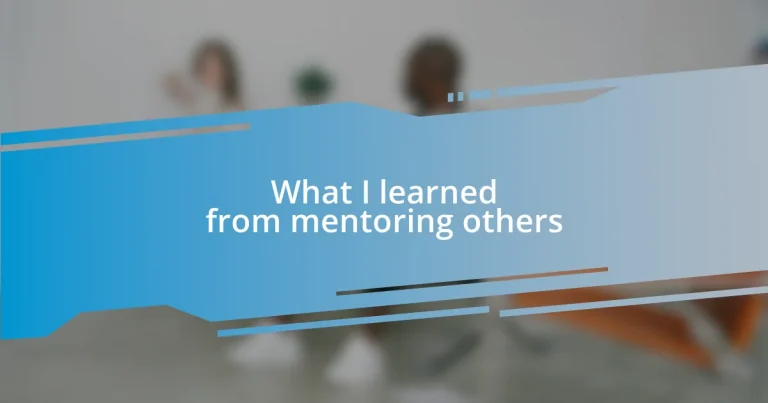Key takeaways:
- Mentoring fosters growth for both the mentor and the mentee, creating lasting relationships and transforming lives.
- Key lessons learned include the importance of patience, embracing diversity, and recognizing that mentoring is a mutual growth experience.
- Empathy and effective communication are essential in mentoring, allowing for deeper connections and enhanced understanding.
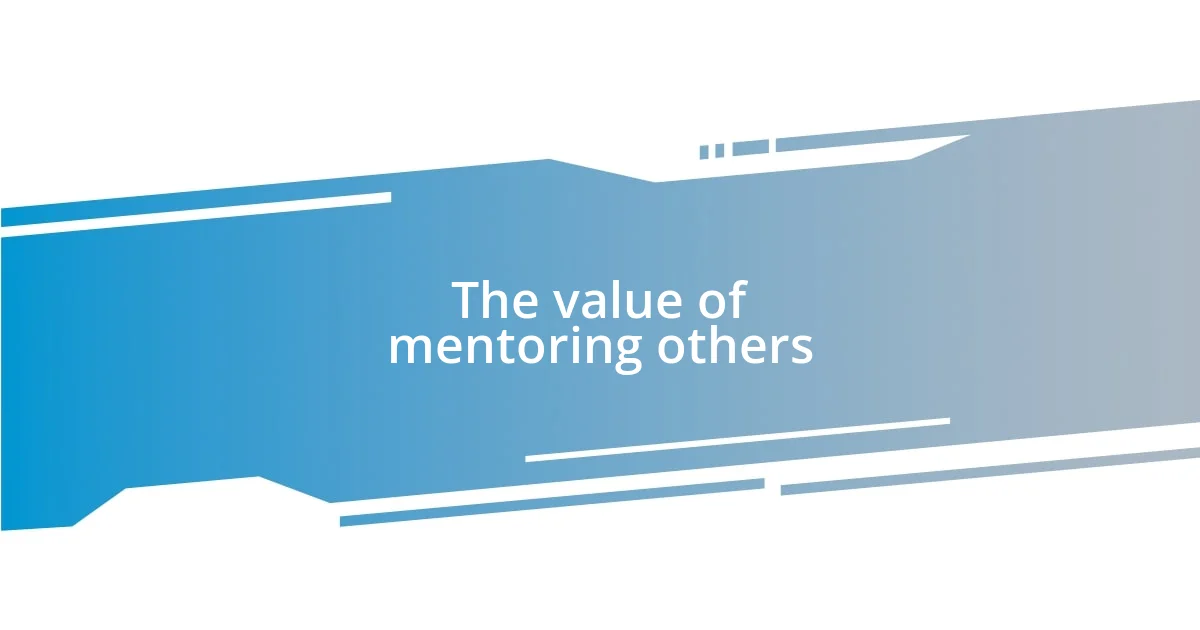
The value of mentoring others
Mentoring others offers a unique opportunity to foster growth, not just for the mentee, but for the mentor as well. I remember mentoring a young colleague who was feeling lost in their career path. Seeing their confidence bloom as they discovered their strengths was profoundly rewarding, and it made me realize that my own journey had shaped me in ways I hadn’t fully appreciated.
There’s something genuinely fulfilling about being part of someone’s transformation. I often found myself reflecting on my early days, filled with uncertainty, as I guided my mentee through challenges. It struck me: are we not all a little lost at some point? By sharing my experiences, I was not just aiding their growth, but also reliving and reinforcing my own lessons learned, deepening my understanding along the way.
The value of mentoring others extends beyond professional development; it cultivates connections that can last a lifetime. As I consider how my mentees have gone on to achieve their goals, I feel a sense of pride and joy. What if I had chosen not to mentor? It’s these relationships that enrich our lives and remind us that every interaction has the potential to make a significant impact.
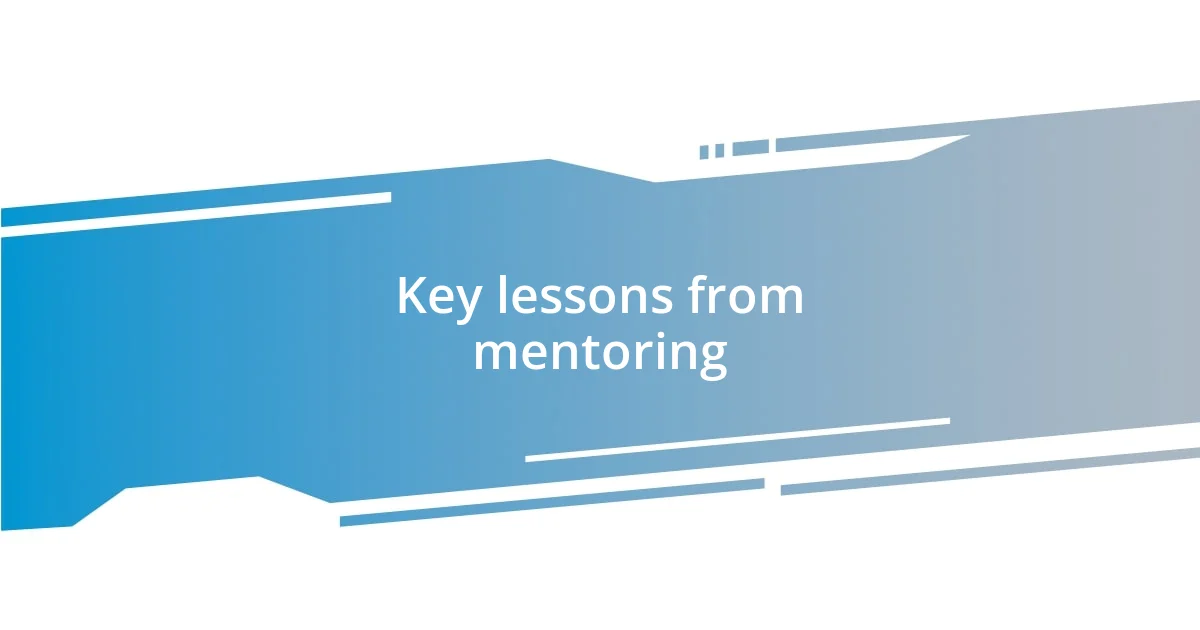
Key lessons from mentoring
Mentoring has taught me the importance of patience. I recall a time when a mentee struggled with a complex project. Instead of rushing to offer solutions, I chose to ask guiding questions. Watching them work through their thought process, I realized that sometimes it’s better to let others find their own way. This not only helps them learn, but it reinforces my role as a facilitator rather than just a problem solver.
It’s fascinating how mentoring can illuminate perspectives I never considered before. I once mentored someone from a vastly different background than mine. Through our discussions, I gained insights into challenges I hadn’t faced, prompting me to rethink my own views. This experience highlighted the power of diversity in mentorship, making me appreciate how different experiences can enrich our understanding of the world.
One key lesson I’ve embraced is the reciprocal nature of mentoring. While I aimed to provide guidance, my mentees often taught me invaluable lessons. I remember one young woman who was so tech-savvy that she introduced me to new tools that transformed my workflow. These moments remind me how mentoring isn’t a one-way street; it’s a mutual growth experience that benefits both parties.
| Lesson | Description |
|---|---|
| Patience | Allowing mentees to navigate challenges fosters independence and deeper learning. |
| Diversity | Engaging with different perspectives broadens understanding and fosters empathy. |
| Reciprocal Growth | Mentoring is a two-way street where both mentor and mentee learn from each other. |
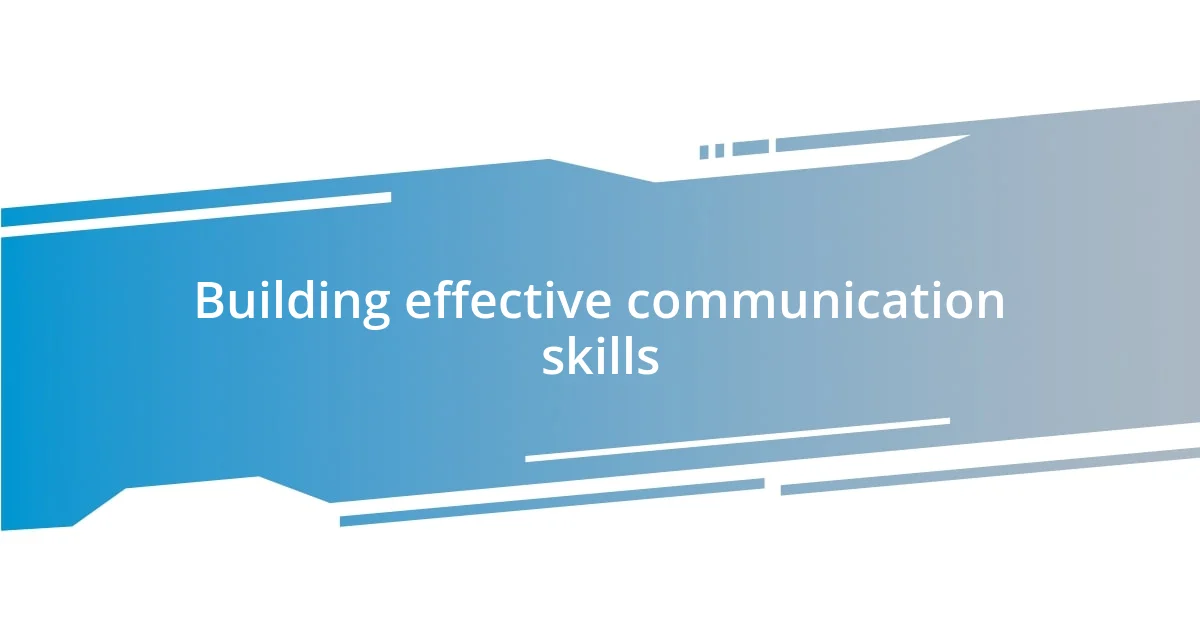
Building effective communication skills
Building effective communication skills is an essential aspect of mentoring that I’ve learned to value deeply. I still remember a time when I struggled to convey complex concepts clearly. I realized that using relatable examples made it easier for my mentee to grasp the ideas I was sharing. This experience taught me that communication is not just about speaking; it’s about connecting meaningfully. The moment I saw her eyes light up with understanding reminded me of the joy that effective communication can foster.
To enhance communication in mentoring, I believe the following practices are crucial:
- Active Listening: Paying close attention to what the mentee says creates a safe space for open dialogue. I learned that asking follow-up questions can stimulate deeper conversations.
- Clear and Concise Language: Using simple, straightforward language avoids misunderstandings. I often think back to times when clarity transformed confusion into clarity, which is incredibly rewarding.
- Non-verbal Cues: Body language plays a significant role. I once noticed how my mentee’s posture changed when she felt comfortable enough to express her thoughts. Recognizing these cues can help foster a more inviting atmosphere.
- Feedback: Giving constructive feedback encourages growth. I make it a point to highlight strengths alongside areas for improvement, making our discussions balanced and encouraging.
These insights have not only shaped my mentoring approach but have also enriched my personal communication style. Each mentoring session feels like an evolving conversation, and being attuned to these nuances has made a profound difference in our interactions.
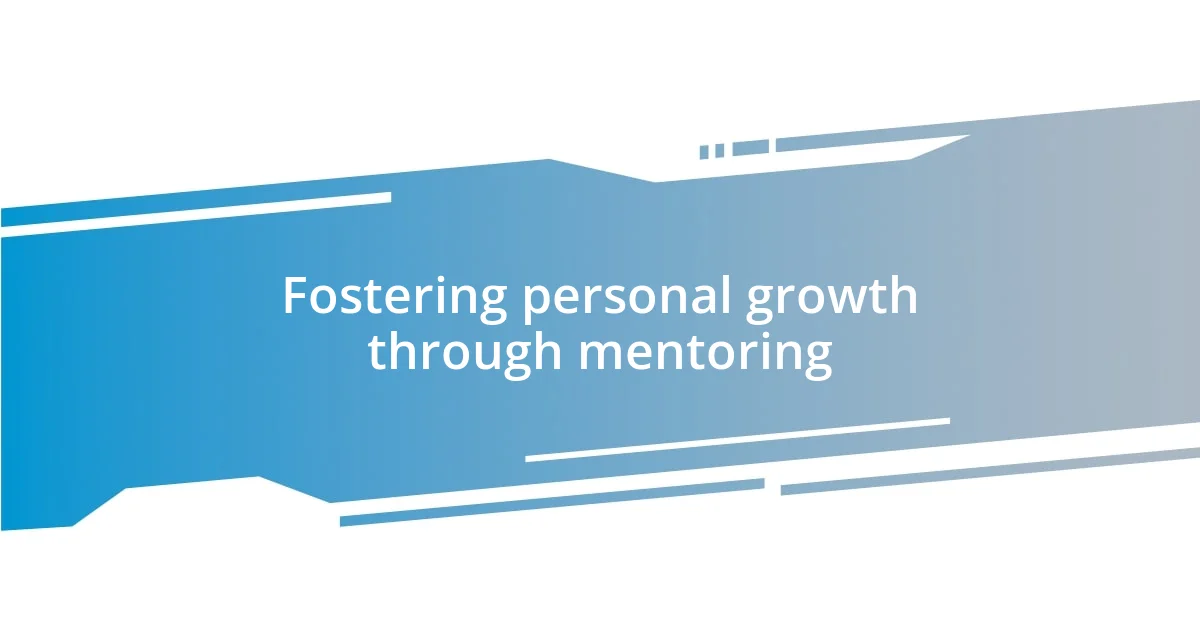
Fostering personal growth through mentoring
Fostering personal growth through mentoring has been a beautiful journey, both for me and my mentees. I once guided a college student who was wrestling with self-doubt. Rather than giving her all the answers, I encouraged her to set small, attainable goals. Watching her reach each milestone was incredible; it felt like catharsis for both of us. This process reminded me that personal growth often springs from stepping outside one’s comfort zone.
There was another instance where I mentored an intern who was overly critical of her own progress. I shared my own story of failures and setbacks during my early career. Hearing about my struggles helped her see that growth is a non-linear path filled with ups and downs. It pushed her to embrace her journey instead of fixating solely on perfection. Moments like these highlight how mentoring can spark a transformative shift in mindset. Have you ever seen someone fully embrace their journey? It’s truly inspiring.
As I reflect on these experiences, I realize that fostering growth isn’t just about skills or knowledge. It’s about cultivating confidence and resilience. I once suggested a leadership workshop to a mentee hesitant to take on responsibilities. When she returned, brimming with energy and excitement, it struck me how mentorship can plant seeds of courage. Witnessing her growth filled me with such pride—a sentiment I think we can all appreciate. After all, isn’t it remarkable to see someone discover their potential through your support?
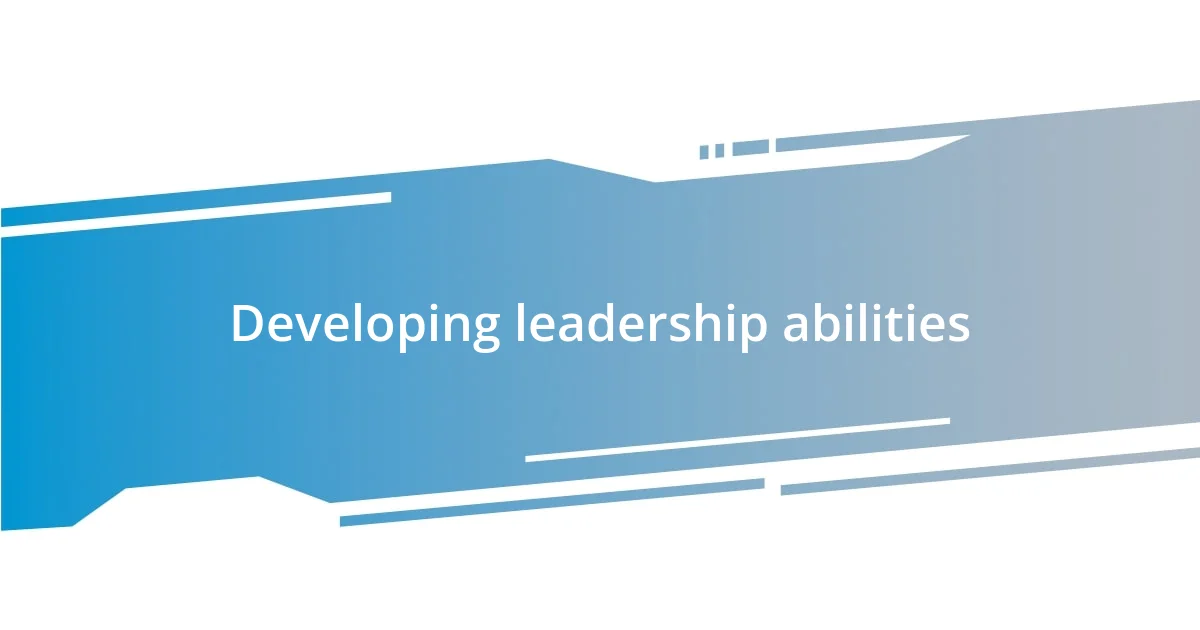
Developing leadership abilities
In my journey of mentoring, I’ve discovered that developing leadership abilities goes hand in hand with empowering others. I remember mentoring a young professional who was initially reluctant to take on team leader responsibilities. During our discussions, I encouraged him to experiment with leading small group projects. Seeing him progressively take charge and inspire his peers was nothing short of exhilarating. Have you ever witnessed someone step into a role they once feared? That transformation is what makes mentoring so rewarding.
One of the most significant lessons I learned is that leadership isn’t just about directing; it’s about inspiring. I guided a mentee through a challenging team conflict. Instead of giving her a directive, I asked how she envisioned a solution. Her response not only surprised her but also encouraged her to articulate her ideas confidently. Watching her gain the courage to voice her thoughts reinforced my belief that leadership allows others to find their voices, which is a powerful catalyst for change.
Ultimately, developing leadership abilities requires patience and trust. I remember struggling to let go of control during a project with a mentee. It was tough to watch her navigate obstacles on her own. However, the moment she suggested a creative solution I hadn’t considered, pride washed over me. It reminded me that sometimes, stepping back is the best way to cultivate future leaders. After all, isn’t that what mentoring is really about—fostering the next generation to shine in their own right?
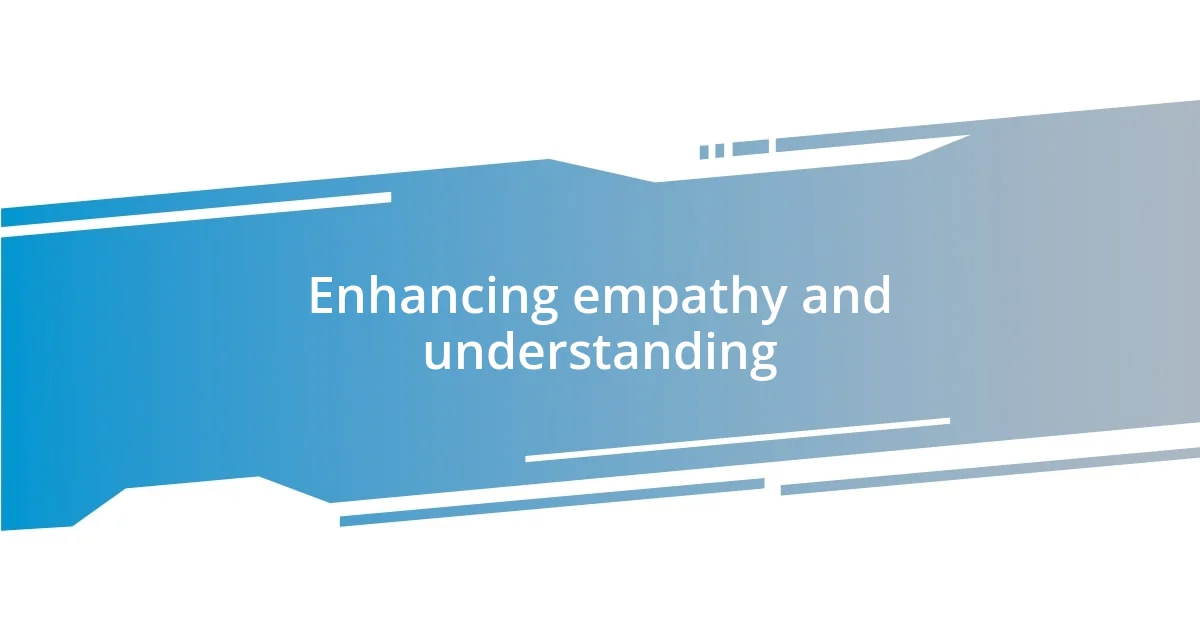
Enhancing empathy and understanding
As I delved into mentoring, I quickly recognized how crucial empathy is in building rapport with my mentees. I vividly remember one evening, late into our mentoring session, a mentee finally opened up about his struggles with anxiety. Listening to him was not just an exercise in patience; it allowed me to step into his shoes and better understand the silent battles he faced. This moment of shared vulnerability deepened our connection and made me realize that empathy is the foundation of effective communication.
During one particularly impactful mentoring experience, a mentee approached me with concerns about a team project that wasn’t going as planned. Instead of jumping in with solutions, I first reflected on a similar situation from my past. Acknowledging my own fears and failures in that moment helped her feel seen and validated. Hasn’t everyone felt the weight of overwhelming situations? By sharing my story, I opened a dialogue that not only eased her worries but also transformed the way we addressed the issue together. It became clear that understanding one another can foster strong problem-solving partnerships.
I’ve come to see empathy as a two-way street in mentoring. There was a time when I was overly focused on guiding someone toward skills they didn’t seem to grasp. It took a sincere check-in to realize she felt completely lost in the process. That conversation altered my approach entirely; it reminded me that mentorship isn’t about prescribing solutions; it’s about nurturing relationships built on mutual understanding. By enhancing empathy, we can untangle complexities within ourselves and others, making the mentoring experience richer for both parties. How often do we stop to consider the emotional landscapes we navigate with our mentees?
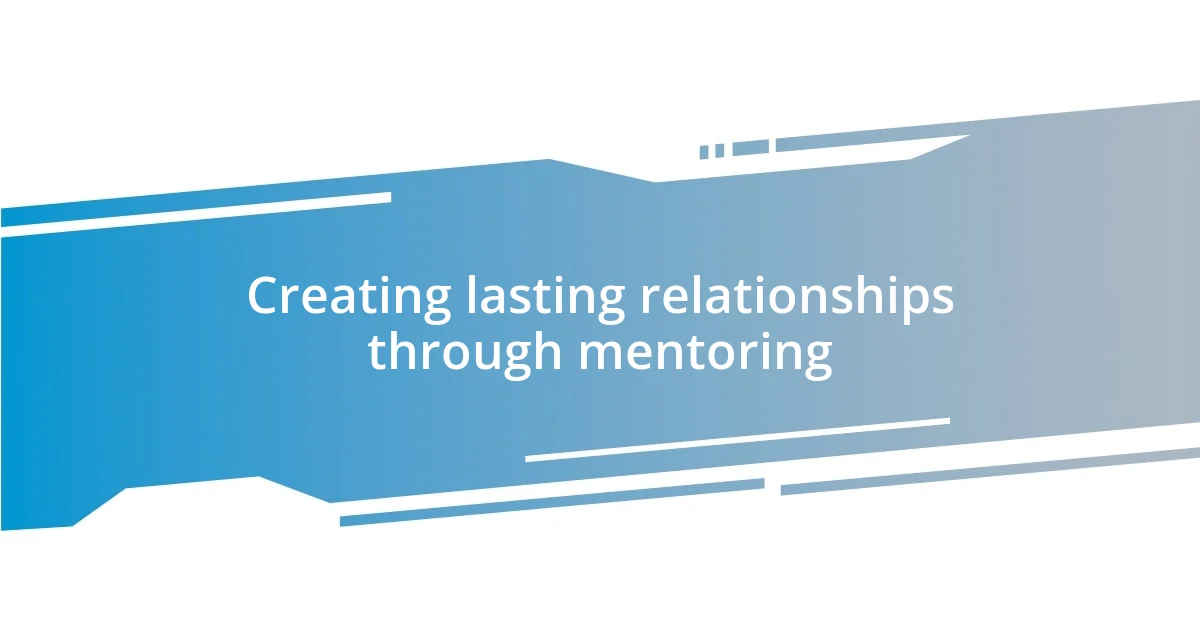
Creating lasting relationships through mentoring
Creating lasting relationships through mentoring is a beautiful journey that can profoundly impact both mentors and mentees. I recall a mentee I worked with over several months. Each meeting felt like unwrapping a gift; we shared stories, learned from failures, and celebrated small wins together. This bond transcended professional boundaries, making our relationship one of mutual trust and respect.
There was a time when a mentee stopped by my office just to chat, away from the formalities of our regular sessions. As we shared a laugh about a project that went humorously awry, I realized that those genuine moments were essential. They built a foundation that made it easier for her to approach me with bigger challenges later on. Have you ever found that laughter can break down barriers and encourage openness? I’ve seen firsthand how these informal interactions can foster lasting connections.
Emotional vulnerability is a key ingredient in mentoring, and I’ve learned to embrace it fully. When a mentee confided in me about feeling overwhelmed and unsure of their abilities, I didn’t just offer reassurance; I shared my own moments of uncertainty. That shared vulnerability wasn’t just a connection; it became a cornerstone of our relationship. It made me wonder: How often do we allow ourselves to be real with others in professional settings? Authenticity creates deeper ties, transforming mentoring from a simple exchange of knowledge into a fulfilling partnership for growth.












